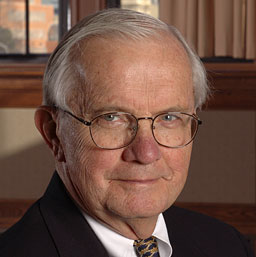« In America, we call that a scoop: Charon QC interviews Lord Falconer. | Main | Original Complaint »
July 30, 2009
Geoffrey Hazard: How U.S. civil litigation is viewed abroad.

If you have European clients, you already know that in-house lawyers across the Atlantic do not like to have their company's commercial disputes heard and decided by American courts (even by our most efficient and respected U.S. district courts). Their reasons, however, turn on more than the obvious and commonly-given ones: lengthy and expensive proceedings, juries hearing civil disputes, and the fear of large damages awards, including punitive damages.
One more reason is the perception abroad of the extraordinary "localism" (generally county-based) of judges and juries in the state systems. Still another is the effect that contingency fee arrangements can have on the litigation process.
There are several more reasons. And every one of them can be troubling to both non-U.S. and American in-house lawyers.
At the podcast series of the International Institute for Conflict Prevention & Resolution (CPR), do not miss the interview by Mike McIlwrath, an in-house lawyer with General Electric in Europe, of Geoffrey C. Hazard, Jr., now at Hastings College of Law in San Francisco, in "American Exceptionalism: U.S. Civil Justice v. the Rest of the World". The July 17 interview is No. 75 in CPR's International Dispute Negotiation series. Hearing the Hazard interview is a "non-billable must" for any American business lawyer (in-house or outside firm) acting for clients in more than one jurisdiction, within or outside of the U.S.
Geoffrey Hazard is a well-known American law professor and author in the areas of civil procedure, federal jurisdiction and ethics. He has also taught law at Boalt, the University of Chicago, Yale, and Penn Law. One of his former students--and his research assistant when Hazard taught at Yale--is U.S. Supreme Court Justice Samuel Alito. Mike McIlwrath is Senior Counsel, Litigation for GE Infrastructure-Oil & Gas, and works out of Florence, Italy. Last year, the IDN series earned both McIlwrath and New York-based CPR an award for ADR excellence from CEDR, an ADR group in London.

Geoffrey Hazard
Posted by JD Hull at July 30, 2009 12:30 AM
Comments
(1) I'm not an expert in anything, but from my limited knowledge of the law I know that arbitration clauses are not a panacea. There is an excellent paper on the American Bar Association's web site, "An Attorney’s Guide to Alternative Dispute Resolution (ADR): 'ADR 1.01'" which goes into great detail about ADR (see http://www.abanet.org/buslaw/newsletter/0008/adr/adr101.pdf). The paper explains at pages 34-35 and footnotes 110 and 112-113 that ADR has been denied in some employment and consumer protection cases. In addition, the paper explains some of the disadvantages of ADR on pages 9-13, the main disadvantage being the lack of appeal.
(2) Regarding my comment about Yale, the school is certainly not on a down-slope when it comes to influence. The two newest Supreme Court Justices are Yale grads, and our two previous Presidents were also Yale grads. My comment reflects my impression that the Yale faculty is often unfair in its criticisms of the U.S. legal system, and not sufficiently critical of other legal systems.
Take, for example, the criticism of jury trials. In the podcast, the professor talked about how the average juror today has a high school education, thereby implying that such individuals are unqualified to judge issues of fact. Yet today's headlines include a story that "Japan relaunches trial by jury." (http://news.bbc.co.uk/2/hi/asia-pacific/8181225.stm). If the average U.S. juror is unqualified, why are the Japanese adopting jury trials for criminal cases? Is the average Japanese juror more qualified than the average U.S. juror? Or perhaps the flaws mentioned in the article apply to other civil law systems as well? ("Critics say the old system was too slow, lacked transparency and was out of touch.")
Another example: several Western European countries (e.g., Italy, Netherlands, Spain) have enacted laws allowing class action litigation (See http://en.wikipedia.org/wiki/Class_action). If class action litigation in the U.S. is merely a remedy for failed regulators and a weak social safety net in the U.S., as argued in the podcast, then why are these countries, which are known for their strong social safety nets, adopting this kind of litigation?
Posted by: Ayal Sharon at August 3, 2009 08:22 PM
"I'm somewhat surprised that a Civil Procedure professor from Yale didn't mention these points. Then again, maybe I shouldn't be surprised."
Ayal--Hazard or McIlwrath can of course respond if they feel inclined; school for Hazard in SF may not have begun, and Mike in Italy is a friend who I will see in October and will likely see your comment.
Re: your point 3, that's a pretty powerful comment--but you may be an expert in FRCP for all we know. I do know that the CPR interviews tend to be shorter in recent programs. That may have been part of the reason.
But, tell us, what do you mean by the above? How many different federal district courts have you practiced in? And federal courts will not enforce arbitration clauses? And is Yale on the down-slide now? Tell us.
I think both participants to the CPR interview know a deal great about removal--as do I.
Yes, bench trials happens in those circumstances--sure. So does ADR.
But why don't you explain your point 3?
Posted by: Dan Hull at August 2, 2009 10:24 PM
(1) Large corporations can usually get cases removed to a Federal district court. Federal district courts draw from much larger jury pools than state courts, so there is less of a selection bias. Also, sometimes defendants can obtain a change of venue.
(2) While one can put an arbitration clause into a contract, the courts will rarely enforce it for many types of claims, including product liability, malpractice, and employment discrimination.
(3) I'm somewhat surprised that a Civil Procedure professor from Yale didn't mention these points. Then again, maybe I shouldn't be surprised.
(4) One final thought: when large U.S. corporations sue one another, do they ask for bench trials? If not, why not? After all, they should be worried about the unpredictability of the jury trial ...
Posted by: Ayal Sharon at August 2, 2009 12:42 PM
Post a comment
Thanks for signing in, . Now you can comment. (sign out)
(If you haven't left a comment here before, you may need to be approved by the site owner before your comment will appear. Until then, it won't appear on the entry. Thanks for waiting.)